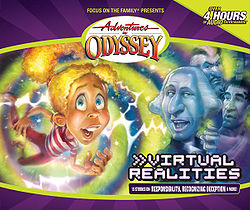A Long and Glorious Tradition
 If you are a parent who thinks most stories for children should be as “normal” as possible …
If you are a parent who thinks most stories for children should be as “normal” as possible …
Or a pastor, small-group leader, or teacher, who simply doesn’t get this “fantasy” thing …
Or a reader or even an author of Christian visionary tales who believes such genres are for mainly “niche” readers, suitable only for e-books or self-publishing or other indie efforts …
I have a few names for you.
And you may also soon notice I don’t even need to invoke the Patron Saints of Visionary Fiction, St. Lewis and St. Tolkien, until later.
Naming names
- Dante’s Divine Comedy (14th century), which takes Scriptures about rebels’ fate in Hell and adds speculation (nine “circles” of punishment), then does the same with Heaven.
- Milton’s Paradise Lost (1667), another supernatural-laced poem, about the fall of man.
- Bunyan’s Pilgrim’s Progress (1678), one of the most popular books ever, and original: pure allegories for sin, the Christian life, etc., mixed with literal elements such as Christ.
- George MacDonald and G.K. Chesterton (late 19th and early 20th century): authors in many different genres, from nonfiction and philosophy, to speculative stories.
- And, yes, the patron saints of Christian visionary fiction: J.R.R. Tolkien and C.S. Lewis, both of whom, though they did not set out to write allegory, nonetheless gave the world fantastic fiction imbuing Biblical themes and truths — Tolkien in his epic creation of an amazing world, Lewis most popularly for his “simple” “children’s” stories that asked as “supposals” what would happen if Christ were involved in another magical land.
Perhaps too many Christians jump past their spiritual ancestors’ rich history of speculative stories in favor of the Patron Saints — just as I may have missed several between, say, Dante and Bunyan! Lots of folks, as Becky Miller observed, like to say things like “so-and-so is the next C.S. Lewis,” or perhaps print “in the tradition of C.S. Lewis” on their books’ front covers. Who, though, would include “in the tradition of Milton” on their book covers?
Maybe authors avoid that because it sounds more high-falutin’. Maybe it was St. Lewis’s and even Tolkien’s mass popularity, along with their academic gifts, that adds to their appeal.
Regardless, Christians today don’t even need to hark back to church history or to St. Lewis to prove the near-omnipresence of fantasy storytelling in even the most cloistered sectors of evangelicaldom. How can I say that? With personal proof, and more names:

- Psalty the Singing Songbook (1980s and early ‘90s). I am not kidding. A humanoid book, full of praise for the Lord, which he endorsed in that memorable, quacking sort of voice that covered for Ernie Rettino’s actual vocal artistry (for years I never knew Psalty and that other singing voice were the same guy). Yes, quite realistic: a humanoid book bouncing about cassette-tape universes to generate musicals with hordes of nameless children. But then they made it even more fantastic, for in tape 7, Psalty invented a time machine. Hear any complaints from conservative churches? Later the creators tried another series, about a talking salamander who was granted by God with the power to fly. Still think speculative stuff is just a niche genre new to popular evangelical culture?
- Adventures in Odyssey. Again I thought about this Focus on the Family-produced audio drama series (began in 1987) when I read that Wayne Thomas Batson, author of The Door Within trilogy, was writing an AiO tie-in novel about an Imagination Station adventure involving pirates. Ha ha! The Imagination Station, a holodeck/TARDIS-like device enabling children to travel in time (sort of) to participate in Biblical accounts or American history, was just one of AiO’s fantasy/sci-fi elements. Others included spies, supervillains, cyber-warfare, mind control (I didn’t much like that story arc), and, most intense of all, an evil scientist who tried to use the Imagination Station to gain eternal life, after almost imprinting himself on the brain of a hostage. Yeah … niche.
- VeggieTales (1990s-present). Talking vegetables. Bible adaptations (often with wild deviations from the source). Sci-fi machines and fantasy-level worlds even for them. …
 So how did they make it?
So how did they make it?
I could go on. In future columns I might. And in those columns, I’ll likely explore a Unifying Theory as to how these things “got through” to people while other speculative stories got stuck in the presses. Yes, those last three were mainly for children, but I don’t think that’s the only common factor. I could throw in the Left Behind series to throw it off. Instead …
The most popular Christian speculative stories seem to have met a conscious need for the Church but also surpassed mere pragmatism in their quality level.
For instance, Psalty fulfilled a need for Resources centered on real worship of God, from the heart, and fun stories and songs besides. (“If it’s not from your heart, it’s not praise! And that makes me sad! Wahhh!”) And AiO gave Wholesome Entertainment for children, yes, with Moral Values, but with memorable characters, settings and stories — and almost no songs — that made it clear this was more than just The Christian Alternative. Adults loved it.
Do new visionary stories remind Christians of this long tradition in church history distant and recent, while also marketing their uniquenesses and how they fulfill Christians’ needs?
“Wow! Actual wholesome Christian fantasy!” is no longer a unique slogan.
Neither should Christian writers feel they must opt only for self-publishing or e-books or niche marketing. I don’t say this is bad, just that it may not be exclusive. The perception that most Christians are closed to fantasy is simply wrong. Perhaps they’re more closed to fantasy that seems derivative, or that doesn’t show how it meets a perceived need and surpasses it.
That leads to how Speculative Faith will seek not only to talk about this need, but address it.

“I’ve hired you to help me start a war. It’s a prestigious line of work, with a long and glorious tradition.”
Enter the Library
Amazon and other online retailers are great. Advantage: you can actually buy books, often cheaper than anywhere else; and you can read reviews. Disadvantage: it sells everything. If you’re looking for Christian visionary novels, they’ll get lost among everything else.
How about your Christian bookstore, real-life or online? You can browse easily enough, often searching for titles by the same author of overall genre. Disadvantage: you can’t find similar books easily with specific elements. “I loved this fantasy novel with portals, pirates, and poachers. Has anyone else written about those?” Or: “Has anyone written a book that combines the steampunk genre and medieval and allegory and mutant-fish-superheroes?”
Behold the Speculative Faith Library, still in progress, yet done enough to soft-launch today.
- Browse for books, authors, and story elements, with a separate library-only search engine and complete lists of authors and novel titles. Everything is sort-able, from A to Z, to newest, to most discussed, and by author and specific series.
- Sort by BookTags and find genres, elements, themes, and series. Like dragon stories? Find only books that contain the dragons BookTag. Favor books with science fiction today? Search for the science fiction BookTag.
- Interact! No silence in this Library. Sign up for updates when a new book is posted, post reviews, or ask questions; and with the new Suggestion Box, let us know of any errors or if you think your favorite author or novel should appear in the Library.
And within days we’ll also have the Library combined with this Speculative Faith blog, giving you even more worlds to explore within this premiere portal for Christian visionary fiction.
The doors have opened. Don’t mind the settling dust. All your favorite God-glorifying, old-truths-in-new-ways visionary stories, all in one network of cyber-shelves. Enter the Library.











































Love the Princess Bride reference!
Just promise me there are no shadows in the Library 😀
No shadows; we promise. Not like this one.
That is one creepy and tragic two-parter.
Great post…and oh so true!
We need our own mascot. Like Psalty…with antennae.
As long as Psalty only has one shadow.
Awesome!
Fantastic! Will the Library include books by Christian authors outside the CBA market as well? Or will it only be for CBA titles?
R.J.: Thus far books in the library database include CBA titles, for sure, but also plenty of non-CBA titles and even POD works that demonstrably fit in the speculative and faith categories. Especially while we’re still adding to the system, if you have any certain author or title in mind you think should be included, and don’t see yet, try the Suggestion Box!
Well, R. J.’s books belong here, for sure. I was going to say, we may want people to hold off suggesting though for a little while since we are so far from getting all the titles entered that we have.
I’m excited about this, though. I think it’s going to be a great tool.
Becky
This is going to be much fun – I will be using it to find more spec books, definitely!
I see you tagged some books by age level.. are you going to do published age level or actual age level? (I’ve a lot of ‘teen’ fantasy books which really aren’t that brilliant age-wise…more like 10-14 rather than 14-18.)
I absolutely totally forgot what the old, old Imagination Station looked like until today. Wowee, it’s like the TARDIS except red and not larger on the inside! And I grinned when I saw ‘no silence in the library’… XD And Kaci, you’re hilarious. XD
If I have my say we’ll have more a “suggested appropriateness” level more than anything else. I’ve seen YA I wouldn’t give to a kid.
I watched that two parter the other night. It’s still creepy. I love it. I also appreciate some of the more tragic moments more.
I love all of the above, from Milton to VeggieTales. And as for Odyssey, I love that too…in fact, I have a Doctor Who/Adventures in Odyssey fanfic in progress.
Yes, Doctor Who and Adventures in Odyssey…Whit, Connie and Eugene as Time Lords.
Link here, if anyone thinks my insanity might have semi-decent results
http://www.fanfiction.net/s/6815436/1/Time_of_Imagination
Win. Want to see. …
My wife, just now, very subtly implied that Mr. Whittaker is a Time Lord.
Obviously, then, the Imagination Station is a modified TARDIS. Sure you don’t actually go anywhere and all the adventures take place in your own imagination …
But shouldn’t Connie and Eugene be his companions, then? (Reading …)
Quite a range! And I enjoy speculative stuff from Lord of the Rings to Justice League animated episodes. ‘Tis fascinating how broad “the” “speculative” “genres” can be.
There’s a link in my previous post.
My first suggestion for the box….um can you wave your magic wand and make it visible? Or it something I’m doing wrong? When I click on the links I get 404 page errors.
Link repaired for the Suggestion Box, Sally. Not sure how that one went bad!
Did you get my suggestion on the suggestion box page? All the links to the library pages in the blog post need to have the dates removed from the URL for them to work for me.
Cool library, though. What a lot of work. Thanks!
The suggestion did come through; also, now I have repaired all the links (originally I had thought only one was not working). Occasionally WordPress likes to get smart with the links and thinks it can save a few bytes by replacing the entire site pathname with ../ . That might work if the link was to a page on the blog, but the Library, while in the same system, is a different setup.
Thanks, Sally.
And why doesn’t comment luv work for me? I have the box clicked.
Whine, whine, whine. 🙂
Ahhh, I just unclicked and then clicked, and voila!
There are some authors in the Speculative Faith’s own “Recommended Authors” list that don’t seem to show up yet.
And shouldn’t authors be listed by last name, too.
Thanks for doing this!
(The Suggestion Box didn’t work for me.)
Martin: how did the suggestion box not work for you?
Also, we have several lists including many other Christian speculative titles and authors that we haven’t yet added. We hope to have those up by the start of next month. So if after then you still don’t see a favorite, let us know.
I will most assuredly be checking out this library.